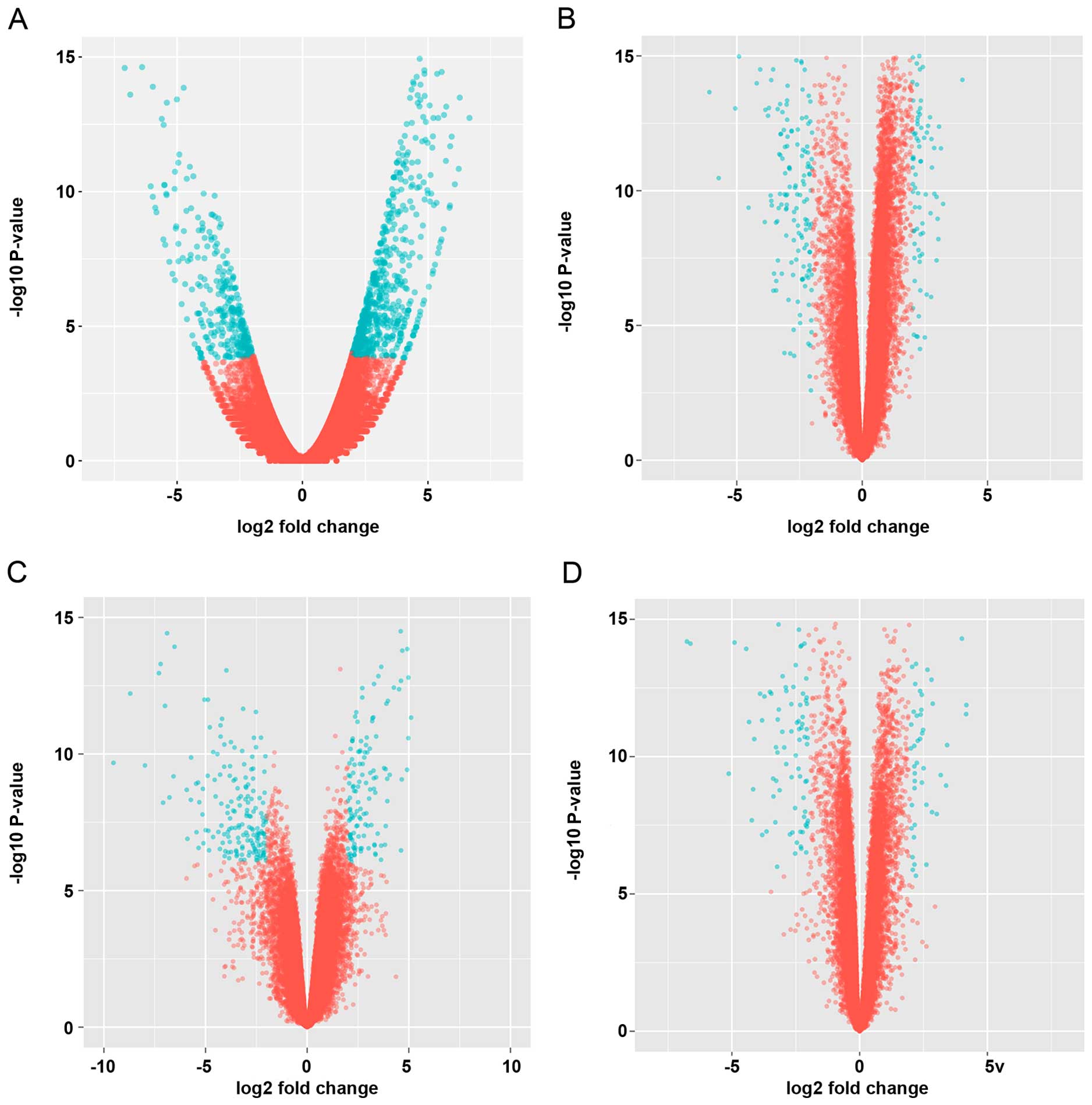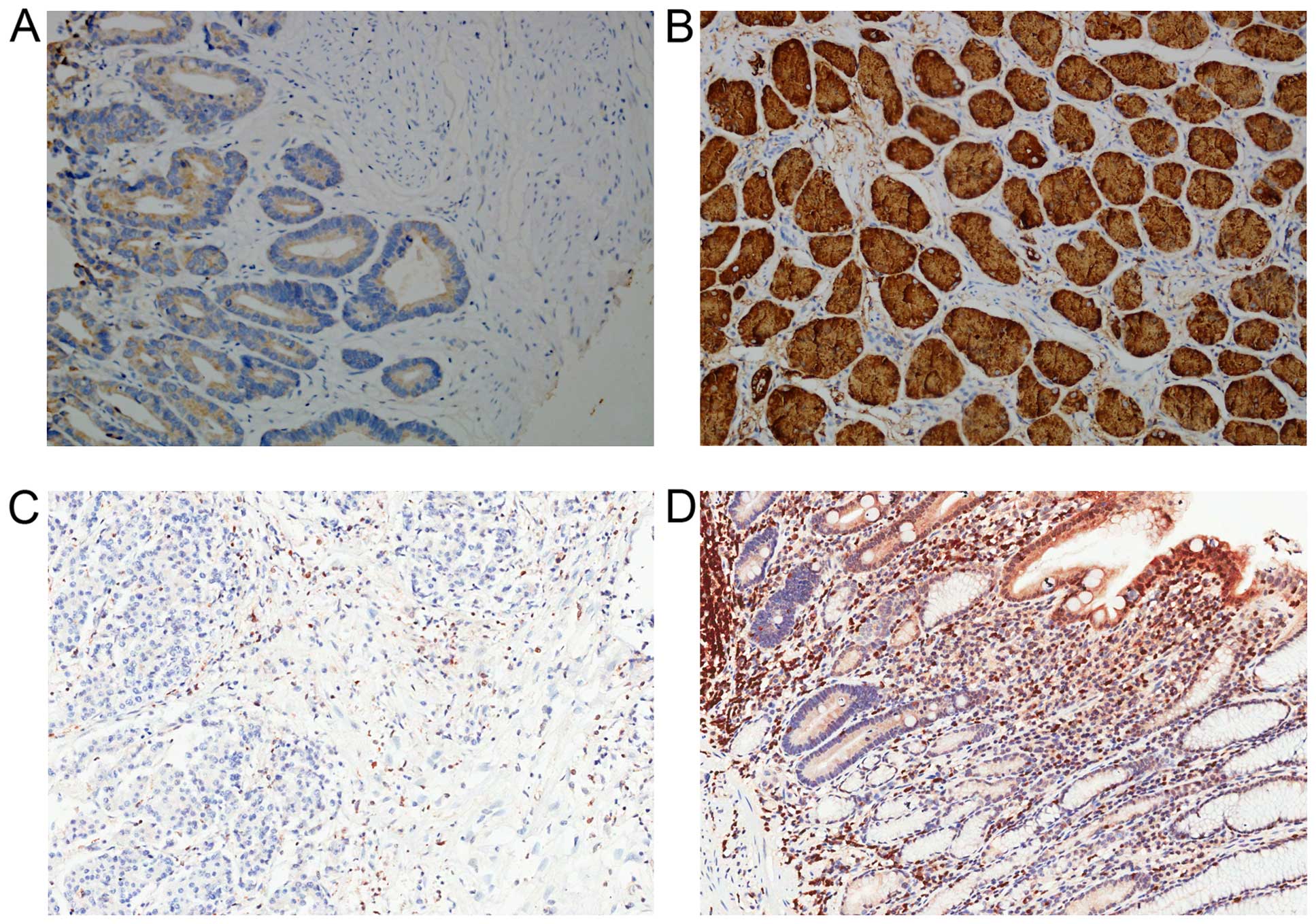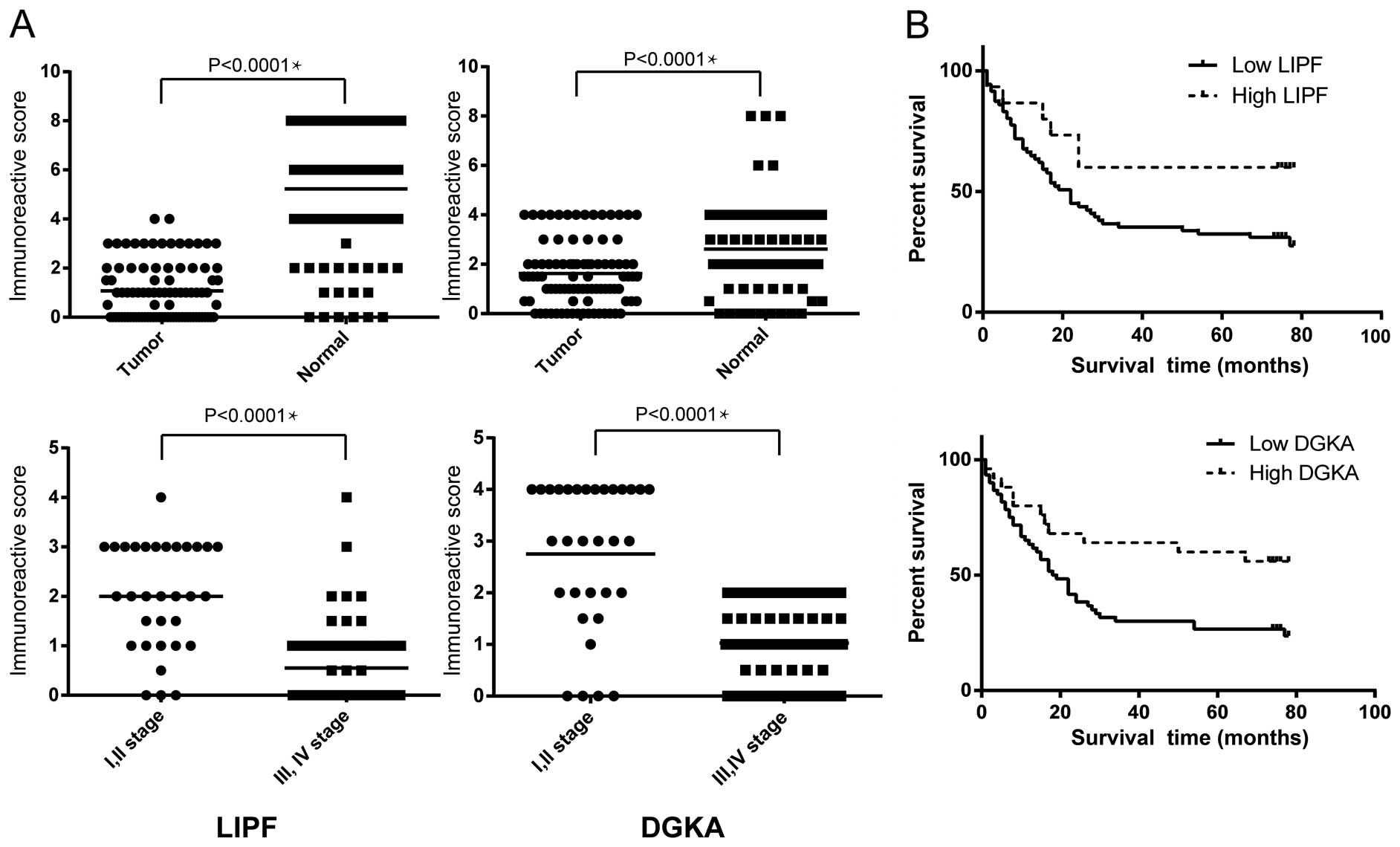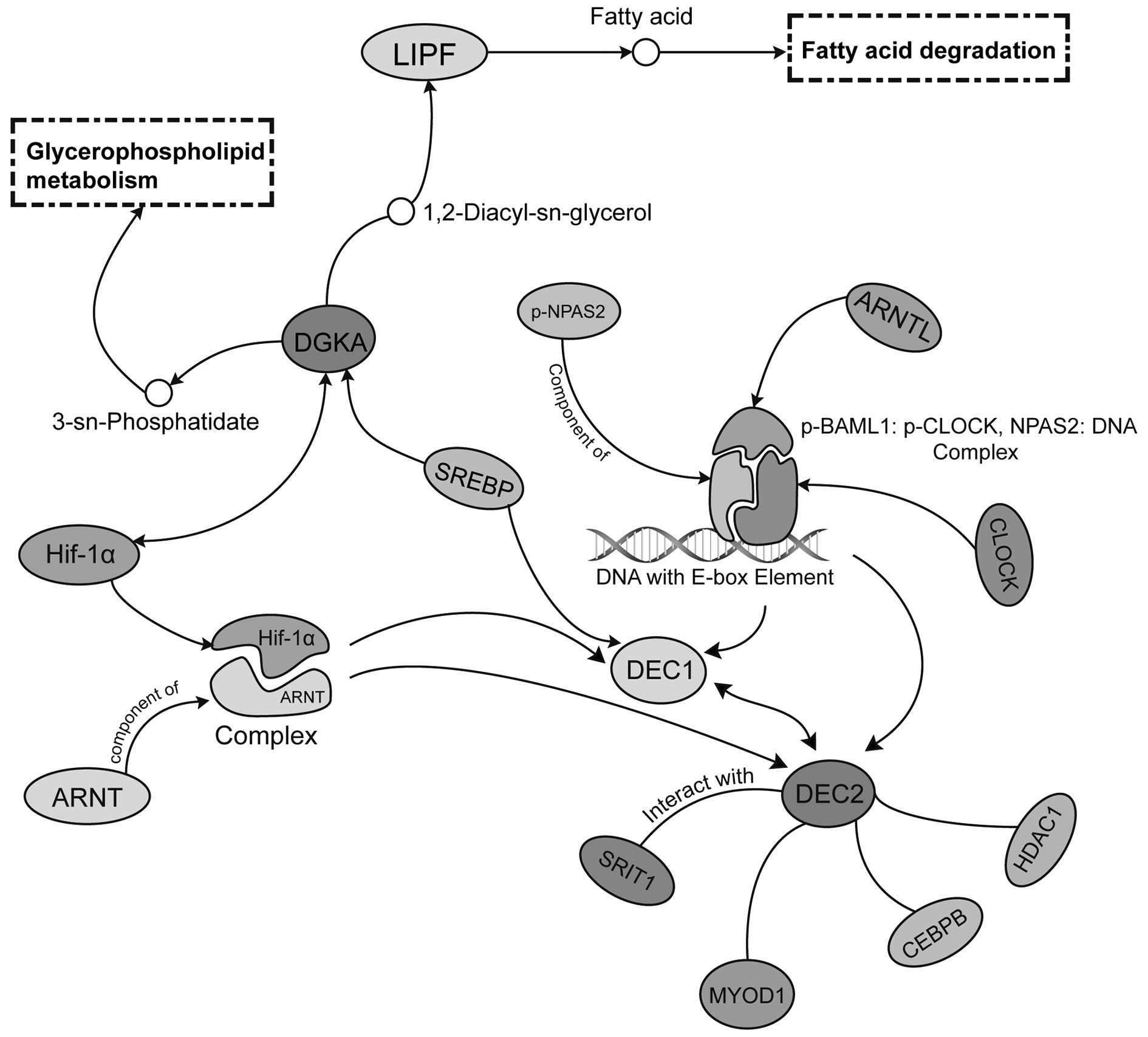|
1
|
Ohata H, Oka M, Yanaoka K, Shimizu Y,
Mukoubayashi C, Mugitani K, Iwane M, Nakamura H, Tamai H, Arii K,
et al: Gastric cancer screening of a high-risk population in Japan
using serum pepsinogen and barium digital radiography. Cancer Sci.
96:713–720. 2005. View Article : Google Scholar : PubMed/NCBI
|
|
2
|
Benjamin DI, Cozzo A, Ji X, Roberts LS,
Louie SM, Mulvihill MM, Luo K and Nomura DK: Ether lipid generating
enzyme AGPS alters the balance of structural and signaling lipids
to fuel cancer pathogenicity. Proc Natl Acad Sci USA.
110:14912–14917. 2013. View Article : Google Scholar : PubMed/NCBI
|
|
3
|
Barrett T, Wilhite SE, Ledoux P,
Evangelista C, Kim IF, Tomashevsky M, Marshall KA, Phillippy KH,
Sherman PM, Holko M, et al: NCBI GEO: Archive for functional
genomics data sets - update. Nucleic Acids Res. 41(D1): D991–D995.
2013. View Article : Google Scholar
|
|
4
|
Trapnell C, Pachter L and Salzberg SL:
TopHat: Discovering splice junctions with RNA-Seq. Bioinformatics.
25:1105–1111. 2009. View Article : Google Scholar : PubMed/NCBI
|
|
5
|
Anders S, Pyl PT and Huber W: HTSeq - a
Python framework to work with high-throughput sequencing data.
Bioinformatics. 31:166–169. 2015. View Article : Google Scholar
|
|
6
|
Robinson MD and Smyth GK: Moderated
statistical tests for assessing differences in tag abundance.
Bioinformatics. 23:2881–2887. 2007. View Article : Google Scholar : PubMed/NCBI
|
|
7
|
Carvalho BS and Irizarry RA: A framework
for oligonucleotide microarray preprocessing. Bioinformatics.
26:2363–2367. 2010. View Article : Google Scholar : PubMed/NCBI
|
|
8
|
Bolstad BM, Irizarry RA, Åstrand M and
Speed TP: A comparison of normalization methods for high density
oligonucleotide array data based on variance and bias.
Bioinformatics. 19:185–193. 2003. View Article : Google Scholar : PubMed/NCBI
|
|
9
|
Ritchie ME, Phipson B, Wu D, Hu Y, Law CW,
Shi W and Smyth GK: limma powers differential expression analyses
for RNA-sequencing and microarray studies. Nucleic Acids Res.
43:e47. 2015. View Article : Google Scholar : PubMed/NCBI
|
|
10
|
Johnson TM and Attardi LD: Dissecting p53
tumor suppressor function in vivo through the analysis of
genetically modified mice. Cell Death Differ. 13:902–908. 2006.
View Article : Google Scholar : PubMed/NCBI
|
|
11
|
Takeishi K, Taketomi A, Shirabe K, Toshima
T, Motomura T, Ikegami T, Yoshizumi T, Sakane F and Maehara Y:
Diacylglycerol kinase alpha enhances hepatocellular carcinoma
progression by activation of Ras-Raf-MEK-ERK pathway. J Hepatol.
57:77–83. 2012. View Article : Google Scholar : PubMed/NCBI
|
|
12
|
Chang HR, Nam S, Kook MC, Kim KT, Liu X,
Yao H, Jung HR, Lemos R Jr, Seo HH, Park HS, et al: HNF4α is a
therapeutic target that links AMPK to WNT signalling in early-stage
gastric cancer. Gut. 65:19–32. 2016. View Article : Google Scholar
|
|
13
|
Tylki-Szymańska A and Jurecka A: Lysosomal
acid lipase deficiency: Wolman disease and cholesteryl ester
storage disease. Pril (Makedon Akad Nauk Umet Odd Med Nauki).
35:99–106. 2014.
|
|
14
|
Pafumi Y, Lairon D, de la Porte PL, Juhel
C, Storch J, Hamosh M and Armand M: Mechanisms of inhibition of
triacylglycerol hydrolysis by human gastric lipase. J Biol Chem.
277:28070–28079. 2002. View Article : Google Scholar : PubMed/NCBI
|
|
15
|
Alonso R, Mazzeo C, Rodriguez MC, Marsh M,
Fraile-Ramos A, Calvo V, Avila-Flores A, Merida I and Izquierdo M:
Diacylglycerol kinase α regulates the formation and polarisation of
mature multivesicular bodies involved in the secretion of Fas
ligand-containing exosomes in T lymphocytes. Cell Death Differ.
18:1161–1173. 2011. View Article : Google Scholar : PubMed/NCBI
|
|
16
|
Kobayashi M, Salomon C, Tapia J, Illanes
SE, Mitchell MD and Rice GE: Ovarian cancer cell invasiveness is
associated with discordant exosomal sequestration of Let-7 miRNA
and miR-200. J Transl Med. 12:42014. View Article : Google Scholar : PubMed/NCBI
|
|
17
|
Das SK and Hoefler G: The role of
triglyceride lipases in cancer associated cachexia. Trends Mol Med.
19:292–301. 2013. View Article : Google Scholar : PubMed/NCBI
|
|
18
|
Louie SM, Roberts LS, Mulvihill MM, Luo K
and Nomura DK: Cancer cells incorporate and remodel exogenous
palmitate into structural and oncogenic signaling lipids. Biochim
Biophys Acta. 1831:1566–1572. 2013. View Article : Google Scholar : PubMed/NCBI
|
|
19
|
Alonso R, Mazzeo C, Mérida I and Izquierdo
M: A new role of diacylglycerol kinase alpha on the secretion of
lethal exosomes bearing Fas ligand during activation-induced cell
death of T lymphocytes. Biochimie. 89:213–221. 2007. View Article : Google Scholar
|
|
20
|
Prinz PU, Mendler AN, Masouris I, Durner
L, Oberneder R and Noessner E: High DGK-α and disabled MAPK
pathways cause dysfunction of human tumor-infiltrating
CD8+ T cells that is reversible by pharmacologic
intervention. J Immunol. 188:5990–6000. 2012. View Article : Google Scholar : PubMed/NCBI
|
|
21
|
Dominguez CL, Floyd DH, Xiao A, Mullins
GR, Kefas BA, Xin W, Yacur MN, Abounader R, Lee JK, Wilson GM, et
al: Diacylglycerol kinase α is a critical signaling node and novel
therapeutic target in glioblastoma and other cancers. Cancer
Discov. 3:782–797. 2013. View Article : Google Scholar : PubMed/NCBI
|
|
22
|
Jia YF, Xiao DJ, Ma XL, Song YY, Hu R,
Kong Y, Zheng Y, Han SY, Hong RL and Wang YS: Differentiated
embryonic chondrocyte-expressed gene 1 is associated with
hypoxia-inducible factor 1α and Ki67 in human gastric cancer. Diagn
Pathol. 8:372013. View Article : Google Scholar
|
|
23
|
Shi XH, Zheng Y, Sun Q, Cui J, Liu QH, Qü
F and Wang YS: DEC1 nuclear expression: A marker of differentiation
grade in hepatocellular carcinoma. World J Gastroenterol.
17:2037–2043. 2011. View Article : Google Scholar : PubMed/NCBI
|
|
24
|
Liu Y, Wang L, Lin XY, Wang J, Yu JH, Miao
Y and Wang EH: The transcription factor DEC1
(BHLHE40/STRA13/SHARP-2) is negatively associated with TNM stage in
non-small-cell lung cancer and inhibits the proliferation through
cyclin D1 in A549 and BE1 cells. Tumour Biol. 34:1641–1650. 2013.
View Article : Google Scholar : PubMed/NCBI
|


















